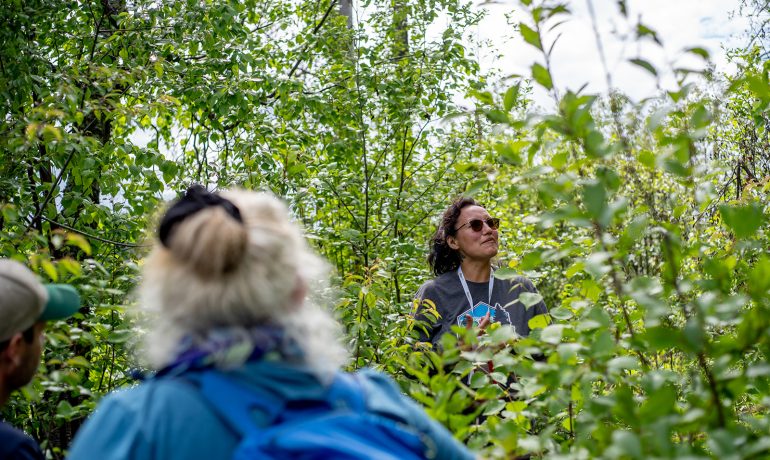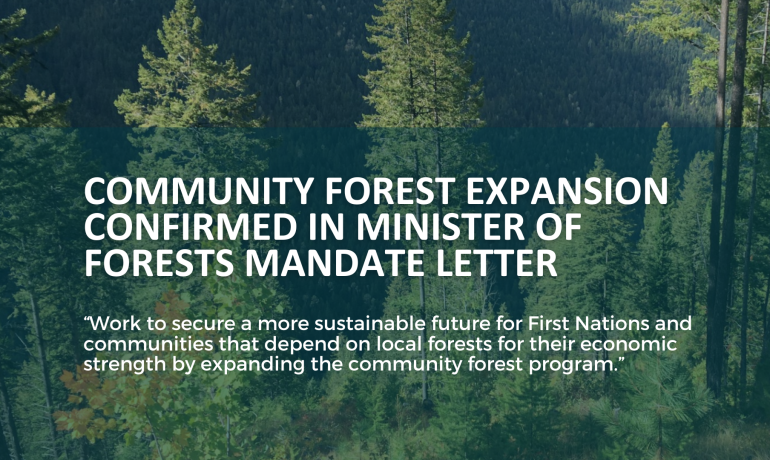After years of respectful dialogue, the B.C government has partnered with the Saulteau and West Moberly First Nations and the federal government to achieve a historic agreement that strives to protect southern mountain caribou in northeastern B.C., while considering the social and economic well-being of communities and stakeholders in the region.
“From the beginning, our government committed to protecting this iconic species,” said Doug Donaldson, B.C.’s Minister of Forests, Lands, Natural Resource Operations and Rural Development. “There’s no question that we’ve had to overcome some challenges along the way, but I am proud of how the parties persevered to find solutions. This agreement is a significant step forward.”
Dozens of First Nations representatives and stakeholders gathered in Vancouver on Feb. 21, 2020, to celebrate the signing of the amended partnership agreement by the provincial government, the federal government, the West Moberly First Nations and the Saulteau First Nation.
In recent weeks, the West Moberly First Nations and Saulteau First Nation offered amendments to the partnership agreement that provide more opportunities for local government involvement in caribou recovery work.
The number of caribou in British Columbia has dropped over the last century from about 40,000 animals to about 15,000. Southern mountain caribou populations now total fewer than 3,100. The population of the central group of southern mountain caribou is about 230.
The partnership agreement reflects a collaborative approach to caribou conservation, which:
- complements the leadership role that the Saulteau First Nation and West Moberly First Nations have already taken on caribou recovery efforts in the Peace region;
- includes a commitment to protect over 700,000 hectares of important caribou habitat in northeastern B.C.;
- builds on the work that the parties have already undertaken in habitat restoration, maternal penning projects and predator management. Through these efforts, the decline of the central group has been reversed. The population is now growing at an average rate of 15% per year; and
- takes into account the social and economic well-being of communities and stakeholders in the region.
Donaldson signed the agreement with:
- Jonathan Wilkinson, federal Minister of Environment and Climate Change;
- Chief Ken Cameron of the Saulteau First Nation;
- Chief Roland Willson of the West Moberly First Nations;
- George Heyman, B.C.’s Minister of Environment and Climate Change Strategy; and
- Bruce Ralston, B.C.’s Minister of Energy, Mines and Petroleum Resources.
Habitat disturbance, predation, climate change and human activities on the landscape have led to declines in caribou populations in recent decades. The B.C. government has been taking concrete steps to address those concerns and develop a comprehensive, made-in-B.C. approach to managing the species.
Part of that approach is the Provincial Caribou Recovery Program. It ensures that Indigenous Nations, local governments, stakeholders and the natural resource sector can participate in the planning and implementation of caribou recovery measures. Ongoing engagement with stakeholders has helped guide recovery efforts for the central group, including a Leaders’ Table meeting held in November 2019 and a series of stakeholder committee meetings that were initiated in January 2020.
The partnership agreement includes new language that clarifies B.C.’s commitment to involving local governments in caribou recovery. Collaboration with local governments and tenure holders will continue to support the effective implementation of the partnership agreement.
The partnership agreement also reconfirms the 2,689-hectare Klin-se-za Provincial Park (pronounced “Klin-see’-za”) will be expanded by about 30,800 hectares. The Province previously committed to a park expansion (Area B2) in 2015, as part of the Saulteau First Nation-British Columbia New Relationship and Reconciliation Agreement. The enlarged park will cover over 34,300 hectares and incorporate two mountains known locally as The Twin Sisters. The Twin Sisters area is considered to be a sacred place by Indigenous peoples in the region and elsewhere, and supports caribou recovery.
The B.C. government will continue to work with the federal government, First Nations, local governments and communities on these initiatives, in accordance with the Declaration on the Rights of Indigenous Peoples Act. The Province also acknowledges the desire of local residents, industry and other stakeholders to pursue their economic goals and participate in other activities on the land base.
Quotes:
Jonathan Wilkinson, federal Minister of Environment and Climate Change —
“The conservation agreements announced today represent bold action to support the survival and recovery of the iconic southern mountain caribou in British Columbia. It has taken a lot of hard work to get us here today. I wish to thank and recognize the leadership of Saulteau and West Moberly First Nations for their continued advocacy and leadership in this agreement. I would also like to thank the Government of British Columbia for its partnership. Today’s agreements are an important step to ensuring that our kids and grandkids can continue to enjoy this species now and into the future.”
Chief Ken Cameron, Saulteau First Nation —
“This is a powerful moment in history, and it’s a turning point for B.C. and Canada and First Nations. People working together to save a species from extinction – it’s real and we can do this – our new partnership agreement confirms it. I want to invite all people to join with us, support us and help make it happen for the future generations to come. Many years ago, our ancestors were given a prophecy from the Creator. The prophecy says that we will find sanctuary at the Twin Sisters mountains. Our people have always kept faith with the prophecy, we know it to be true. It is so fitting that by protecting the Twin Sisters area here today, we can now also give sanctuary to our endangered caribou in the future.”
Chief Roland Willson, West Moberly First Nations —
“For thousands of years, the caribou have given us food, clothes and tools to survive harsh winters. They are not just animals to us. They are our brothers and sisters, our friends and our ancestors. The caribou have been suffering for decades as their habitat is destroyed piece by piece. They need us now — all of us. This partnership agreement gives us hope. It means that help is on the way. To my fellow elected representatives of the Peace region, I thank each of you that worked productively with us at the Leaders’ Table and during engagement on this agreement over the last year. Now, the real work begins. Several doors have been opened for you to participate. We look forward to this collaboration and to joint efforts dispelling myths, combating racism and promoting a region rich in wildlife, culture and sustainable economic activity.”
George Heyman, B.C.’s Minister of Environment and Climate Change Strategy —
“Protecting and promoting at-risk species requires everyone to collaborate in order to do the important work of restoring habitat and piloting new ways to support a return to healthy numbers. We committed several months ago to completing this partnership agreement while also ensuring respectful engagement with local governments. The Saulteau and West Moberly First Nations have demonstrated leadership by putting in practice new ways to address the decline in the caribou population in the South Peace.”
Bruce Ralston, B.C.’s Minister of Energy, Mines and Petroleum Resources —
“Collaboration has been at the heart of this partnership agreement. It’s a perfect example of how government can work with its partners to consider both economic and environmental interests while balancing community needs with caribou recovery.”
Quick Facts:
- The decline of caribou populations in British Columbia is a complex problem that requires a thoughtful, inclusive process to stabilize populations and build a broadly supported Caribou recovery program.
- Through the Provincial Caribou Recovery Program, the B.C. government has committed $47 million over five years to support caribou recovery, using a comprehensive, science-based approach.
- These initiatives include herd planning (a collaborative approach involving Indigenous Nations, industry, stakeholders and governments), habitat management, protection and restoration, maternity penning programs, a supplemental feeding program, animal relocations, predator management and other measures.
- The B.C. government has also provided $8.5 million to the Habitat Conservation Trust Fund to implement caribou habitat restoration programs.
Learn More:
To read an open letter from Chief Ken Cameron to Premier John Horgan, visit: https://news.gov.bc.ca/files/Saulteau_letter.pdf
Related Post
As Published in Canadian Forest Industries Magazine, Pulp & Paper Magazine and Canadian Biomass Magazine
Jennifer Gunter’s Op Ed, “Community Forests: Rooted in Community,
Minister of Forests Mandated to Expand BC’s Community Forest Program
In the recently released mandate letter to the Minister



